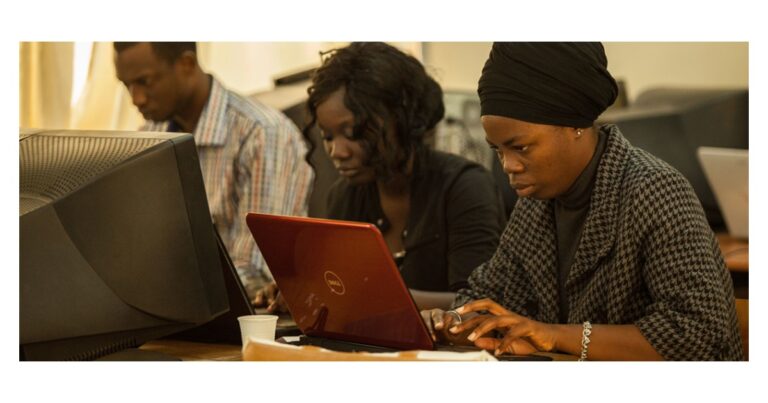What if Africa’s greatest wealth wasn’t minerals, oil or land, but rather its youth? With 60 percent of its population under the age of 25, this continent is full of energy, creativity and potential. But as the world is increasingly shaped by digital technology and artificial intelligence (AI), millions of young Africans remain disconnected, not by choice but by lack of opportunity.
This is not just a missed opportunity. It’s a call to action.
Africa is at a pivotal point in its digital transformation journey. The rapid expansion of digital services is expected to create 230 million digital jobs in sub-Saharan Africa by 2030.
So the potential is huge, but the question is how to unleash it.
bridging the digital divide
By 2024, internet penetration in Africa will reach 40 percent, up from 3.2 percent in 2005. More than 600 million people on the African continent now use mobile broadband internet. Despite progress, more than 900 million people remain offline and 76% face an “usage gap.” They live in areas covered by the network but lack the means or skills to access digital services. In rural areas, access is only 28%.
Bridging the digital divide is as much a social obligation as it is an economic one. Digitalization is democratizing access to education, healthcare, financial services, and markets. It reduces inequality, empowers communities and creates millions of jobs. The advent of international submarine cables and mobile broadband internet has already increased labor force participation and increased incomes in several African countries. The ramifications for agriculture, industry and tourism could be transformative.
Turning local success into local norms
There are many real-world success stories in West and Central Africa that demonstrate what is possible. In Benin, for example, more than 250 public services are now accessible online, 68 municipalities are connected to fiber optics, and mobile coverage reaches 92 percent of the territory. Community-based training programs have helped thousands of people learn digital skills. Awa, a high school student, now has access to an online learning and mentorship platform that expands opportunities for herself and her community in the areas of education, entrepreneurship, and citizenship.
These successes don’t have to be exceptional. To strengthen digital inclusion in a sustainable way, these need to become the norm across the region. Despite growing coverage, nearly 700 million Africans still do not use the internet. The reason is obvious. Access alone is not enough. We need to go beyond that by making data affordable, providing relevant services, and enhancing digital education.
A pivotal moment in digital transformation
Themes such as the utilization gap, opportunities related to AI and the single digital market will be at the center of discussion as leaders, decision makers, the private sector and civil society organizations gather for the Regional Summit on Digital Transformation in West and Central Africa to be held in Cotonou, Benin on 17-18 November 2025.
Africa’s AI market is estimated to be worth $2 billion by 2025 and is driven by startups and the introduction of optimization applications and consumer services. But the goal should be about adaptation and creation, not just recruitment. Ethical and local solutions tailored to Africa’s needs are already emerging. Benin is deploying AI in agriculture, health, education, and public services, including a Fon speech recognition model to improve access for rural areas and the elderly. Many innovations are underway in African countries, demonstrating the continent’s dynamism and the potential of digital technology.
Scaling up these innovations also requires investment in enabling STEM (science, technology, engineering, and mathematics) education, basic infrastructure, and regulatory frameworks.
The African Union’s Digital Transformation Strategy (2020-2030) provides a roadmap towards harmonized digital markets and unlocks the potential of e-commerce, cross-border payments and digital exchange. Africa’s e-commerce market is estimated to be worth more than $50 billion in 2024 and is expected to grow at least 10% annually. Realizing this potential requires regional connectivity, cross-border data flows, interoperable platforms, and supporting regulations, including cybersecurity and data protection.
Build a vibrant digital ecosystem for jobs and growth
The Cotonou Summit will be an opportunity to renew our commitment to inclusive digital progress, including closing the digital divide, developing AI capabilities and creating digital jobs in West and Central Africa. Through accelerated digitalization and deeper regional integration.
These are ambitious but achievable goals. Through collective action, we can build a digital future that is inclusive, innovative and resilient. Governments and their partners (including the World Bank, the private sector, and civil society) are forging new partnerships and mobilizing investment, including through the Digital Compact.
The summit will ensure that everyone has a voice, with governments leading the way on needed reforms, the private sector investing in innovation and infrastructure, and young people developing creativity and resilience.
Seize this moment to accelerate your digital transformation and move forward one step at a time. The continent’s future is digital and shaped by AI. Let’s build it together for our sub-regions.
This work was originally published in French in Jeune Afrique.


